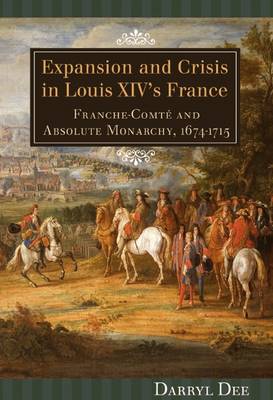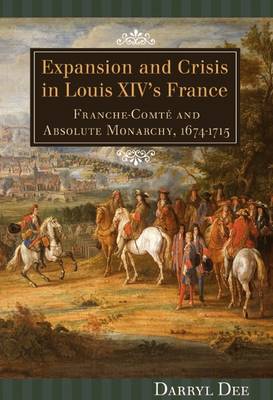
En raison d'une grêve chez bpost, votre commande pourrait être retardée. Vous avez besoin d’un livre rapidement ? Nos magasins vous accueillent à bras ouverts !
- Retrait gratuit dans votre magasin Club
- 7.000.000 titres dans notre catalogue
- Payer en toute sécurité
- Toujours un magasin près de chez vous
En raison de la grêve chez bpost, votre commande pourrait être retardée. Vous avez besoin d’un livre rapidement ? Nos magasins vous accueillent à bras ouverts !
- Retrait gratuit dans votre magasin Club
- 7.000.0000 titres dans notre catalogue
- Payer en toute sécurité
- Toujours un magasin près de chez vous
Expansion and Crisis in Louis XIV's France
Franche-Comté and Absolute Monarchy, 1674-1715
Darryl Dee
177,45 €
+ 354 points
Description
New insights on the growth of the territorial state in early modern Europe, the nature of the French absolute monarchy, and the political legacy of the Sun King. Driven by a desire for glory and renown, Louis XIV presided over France's last great burst of territorial expansion in Europe. During the first three decades of his rule, his armies conquered numerous territories along France's borders. After 1688, however, the tide of conquest turned as the kingdom was plunged into crisis. For the remainder of his reign, the king and his people endured wars against grand alliances of European powers, ecological disasters, economic depression, state bankruptcy, and demographic stagnation.
Expansion and Crisis in Louis XIV's France examines these central yet understudied aspects of the age of the Sun King through the experience of Franche-Comté, a possession of the Spanish empire with a long history of autonomy, conquered by Louis XIV in 1674. Dee's detailed research reconstructs the ensuing dialogue -- sometimes harmonious, sometimes discordant -- between the king and the elites who ruled this province. The integration of Franche-Comté into France proved to be a protracted process involving confrontation, negotiation, and compromise. The resulting regime was then severely tested by the challenges of Louis XIV's late reign; its survival demonstrated how the king had brought a distinctly early modern state to the height of its development.
This study offers significant new insights on the growth of the territorial state in early modern Europe, the nature of the French absolute monarchy, and the political legacy of the Sun King. Darryl Dee is Assistant Professor of History, Wilfrid Laurier University, Waterloo, Canada.
Expansion and Crisis in Louis XIV's France examines these central yet understudied aspects of the age of the Sun King through the experience of Franche-Comté, a possession of the Spanish empire with a long history of autonomy, conquered by Louis XIV in 1674. Dee's detailed research reconstructs the ensuing dialogue -- sometimes harmonious, sometimes discordant -- between the king and the elites who ruled this province. The integration of Franche-Comté into France proved to be a protracted process involving confrontation, negotiation, and compromise. The resulting regime was then severely tested by the challenges of Louis XIV's late reign; its survival demonstrated how the king had brought a distinctly early modern state to the height of its development.
This study offers significant new insights on the growth of the territorial state in early modern Europe, the nature of the French absolute monarchy, and the political legacy of the Sun King. Darryl Dee is Assistant Professor of History, Wilfrid Laurier University, Waterloo, Canada.
Spécifications
Parties prenantes
- Auteur(s) :
- Editeur:
Contenu
- Nombre de pages :
- 259
- Langue:
- Anglais
- Collection :
- Tome:
- n° 13
Caractéristiques
- EAN:
- 9781580463034
- Date de parution :
- 01-09-09
- Format:
- Livre relié
- Format numérique:
- Genaaid
- Dimensions :
- 152 mm x 229 mm
- Poids :
- 553 g

Les avis
Nous publions uniquement les avis qui respectent les conditions requises. Consultez nos conditions pour les avis.






